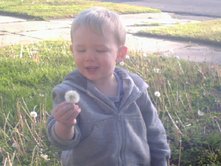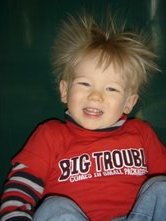 I am fairly confident my sermon this week might soar far above some of my kid's heads but I am okay with this. Because I think we need to start talking about topics like "trinity" and "community" long before any of us can claim any rational hold on it. Perhaps my kids will "get it" more then we could ever hope to ourselves.
I am fairly confident my sermon this week might soar far above some of my kid's heads but I am okay with this. Because I think we need to start talking about topics like "trinity" and "community" long before any of us can claim any rational hold on it. Perhaps my kids will "get it" more then we could ever hope to ourselves.This week's passage comes from 2 Corinthians chapter 13. The Episcopal lectionary began with verse 5 instead of verse 11 and I appreciated this inclusion. So I will be preaching from 2 Corinthians 13:5-14 where Paul gives us a few last sentences as he says goodbye to the people in Corinth.
The first portion of this text, verses 5-9, include Paul urging the Church in Corinth to put themselves up for a test. He tells us we must be willing to "look closely" at ourselves and "test ourselves." This test, he says, will access if we are living in the faith. My kids take all sorts of tests. They take multiple choice tests, spelling tests, math tests, and even reading comprehension tests. But Paul asks us to open ourselves up and examine ourselves with this test.
Then I am going to skip down a few verses to verse 14 before we tackle the verses that immediately follow. For verse 14 (and if this verse is not included in your text open an NRSV or NCV) says, "The grace of the Lord Jesus Christ, the love of God, and the fellowship of the Holy Spirit be with you all." This might get a little sticky for the kids. I am going to push them to tell me WHO the main character of this verse is. I have high hopes they will say God. But then I will push them even further to tell me how many Gods are in this verse. I have high hopes they will say one. But I am prepared to preach and teach regardless of how they answer.
I will teach them it is Trinity Sunday, one of the holiest days in our Church calendar, where we celebrate God the Father ("the love of God"), God the Son ("the grace of the Lord Jesus Christ"), and God the Spirit ("the fellowship of the Spirit"). I also intend to "bust out" the Nicene Creed where we confess together "We believe in ONE GOD, the Father Almighty... And in Jesus Christ, God's only Son..." and in "the Spirit, the giver of life." But my main point will be that: We see God the Father, through the action of God the Son on the cross, and God the Spirit breathes life into God the Son. The ONE God lives in community. We serve a communal God.
Now we are ready to go back to the verses preceeding. For this communal God we celebrate on Trinity Sunday, urges us to live in community. And verse 11, shows us how to TEST ourselves in COMMUNITY. This verse reads, "Live in harmony. Do what I have asked you to do. Agree with each other, and live in peace." Three main things are here: 1) Live in Harmony (by doing what I said). 2) Agree with each other. 3) Live in Peace.
This is how we will formulate our test, by exploring these three things.
1) Live in Harmony. I preach from the NCV so kids can comprehend it easier. But this is translated in other versions as "put things in order (NRSV)," and "aim for restoration (ESV)." I love this term about restoration. It is a facinating word because it implies healing. It forces us to think about what creation was MEANT to be like before we needed healing. Creation was intended for community. Creation was intended for loving one another. But we fell. We choose ourselves over our Creator God. But God wants something better for us. Our Church community is meant for something better then selfishness. We, the Church community, are to be a piece of what that restoration and healing of creation is to look like.
So our question for our test will be: When people outside our community look at us (this community) do they see us as a piece of what creation was intended; a group of people who really love each other?
2) Agree with Each Other. The New Jerusalem translates this "Be United," the NLT translates this "encourage each other," and the ESV translates this "Comfort one another." If we are united and in agreement with one another, then we sacrifice ourselves for one another.
So our question for our test will be: Have you sacrificed what you want for others in this Church Community?
3) Live In Peace. Peace is so far beyond a lack of conflict and fights. Peace is an amazing word. Peace means that we, the Church community, LOVE above all else. Peace means that we care about each person in the world and in our Church the same. Peace means we do not draw a line in the sand and say "we only love you because you are like us." Peace means we see the very image of God in each person, no matter who they are or what they have done. Peace means that we, the Church Community, love everyone in the same way God loves them.
So our question for our test will be: When you look at someone you do not really like, can you see God's very image inside of them?
So to review. Our three questions to test ourselves to see if we are living in the faith as a community are:
1. When people outside our community look at us (this community) do they see us as a piece of what creation was intended; a group of people who really love each other?
2. Have you sacrificed what you want for others in this Church Community?
3. When you look at someone you do not really like, can you see God's very image inside of them?
And then, we must look at verse 12. It is fascinating. It reads, "Greet each other with a holy kiss." This will be a fun thing for the kids. They will undoubtedly say "gross" and "nasty." So we will look at what Paul meant in his day. Hundreds and hundreds of years ago (I chose that number because most of them cannot comprehend beyond 12 years), people greeted each other with a kiss. But it could easily be a normal and mundane thing. It would be something you just automatically did, when you saw someone. But Paul is saying, GREET each other with a kiss! Let this kiss be a symbol of your communal love for one another.
So we will look at the things we do when we pass the test and "Jesus Christ is in us." For if Jesus is in us, we should act like we love each other. We will look at 3 things that should be symbols of our communal love and not mundane, normal things we do. 1) "How are you?" Most of us say this and we expect the answer "fine." But could this become a symbol of our communal love for one another? 2) What about handshakes? Perhaps this could be packed with communal love the next time you get a chance. 3) What about hugs?
Paul urges us to test ourselves, give ourselves a test to see if we are living in harmony, agreeing with one another, and living in peace. And we came up with three questions to ask ourselves. The three questions are hard and quite convicting. We also evaluated the way we interact with each other and I will leave them with the command to go "Love the Community right into each other." :)



